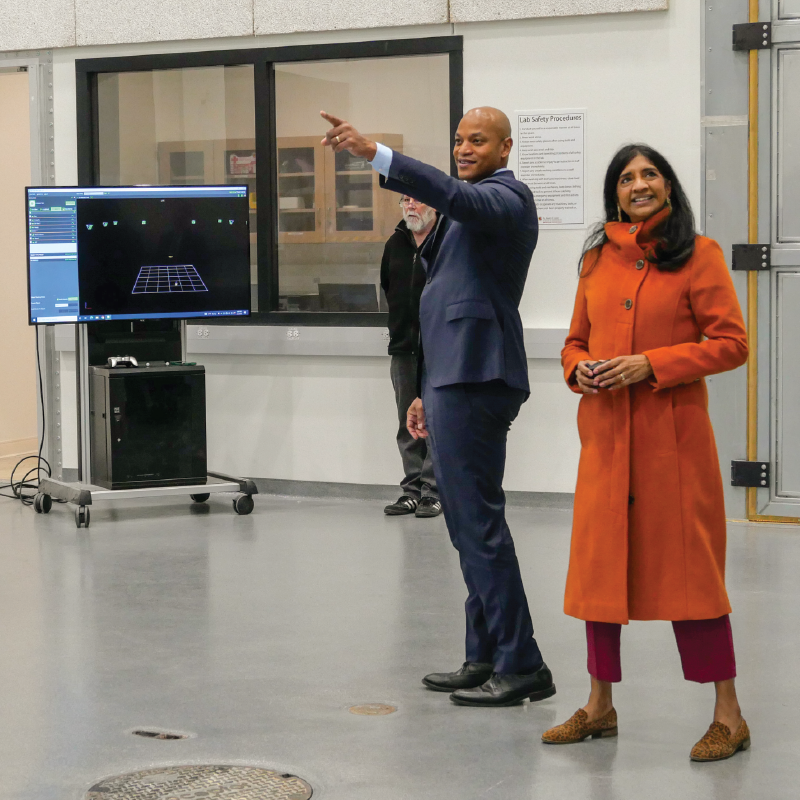News Story
UMD, Booz Allen Hamilton Announce Collaboration with MMEC

UMD’s participation in the MMEC will be led by Prof. Ankur Srivastava, Director of the Institute for Systems Research.
The University of Maryland (UMD) and Booz Allen Hamilton have announced a new collaboration with the Midwest Microelectronics Consortium (MMEC), enhancing and expanding MMEC’s technical area core competencies and infrastructure in secure edge microelectronics, 5G/6G communications, and microelectronics to support artificial intelligence. The kickoff meeting with government officials took place on February 7, 2024, in Columbus, Ohio as part of MMEC’s Microelectronics Commons Roadshow site visit.
"We are excited about this new opportunity to demonstrate technical capability and leadership for our nation in a strategic area of national interest,” said A. James Clark School of Engineering Dean Samuel Graham, Jr. in a recent column. “Working with Booz Allen Hamilton and our other partners, we hope to make a strong impact on the future of the semiconductor supply chain and national defense through the ME Commons program."
In December 2022, UMD teamed with Booz Allen Hamilton to create the Mid Atlantic Semiconductor Collaborative (MASC) for the Department of Defense’s (DoD) Microelectronic Commons (ME Commons) solicitation. UMD’s team was led by Institute for Systems Research (ISR) Director Ankur Srivastava, and consisted of Professors Pamela Abshire and Abhijit Dasgupta, and Dean Graham.

"ME Commons is a critical, nationwide effort—establishing new collaborative relationships is essential to success,” said Doug Palmer, senior associate at Booz Allen Hamilton. “We are excited to support MMEC and collaborate with all members to enhance the hub’s technical capabilities and contribute to its regional strengths!"
"We are excited about this new opportunity to demonstrate technical capability and leadership for our nation in a strategic area of national interest. Working with Booz Allen Hamilton and our other partners, we hope to make a strong impact on the future of the semiconductor supply chain and national defense through the ME Commons program."
Samuel Graham, Jr., Dean, A. James Clark School of Engineering
MASC included a broad and diverse group of universities, community colleges, Historically-Black Colleges and Universities, small businesses, and defense industry partners from across the Mid-Atlantic. MASC targeted several aspects of national security through design, fabrication, and testing of microelectronics in five key areas of priority to the DoD: quantum, electronic warfare, artificial intelligence, 5G/6G, and secure edge computing.
While the MASC hub solution was not selected by ME Commons, UMD and Booz Allen Hamilton came to an agreement and executed a Memorandum of Understanding to join the MMEC. UMD and Booz Allen Hamilton will have a seat on MMEC’s steering committee and provide leadership in the initial standup of consortium working groups. UMD’s participation in the MMEC will be led by Srivastava, the ISR Director.
"The partnership with UMD and Booz Allen strengthens MMEC's technical roadmap, member access to regional infrastructure and resources, and bolsters our workforce development initiatives," stated MMEC CTO Dr. Matt Casto. "We are excited to welcome the former MASC network organizations to the MMEC ecosystem, focused on developing technology, products, and services that will deliver a sustainable, lasting, microelectronics innovation pipeline for the nation."
The United States has made major investments in the onshoring of semiconductor manufacturing through the CHIPS and Science Act. Nearly $39 billion will go towards new domestic manufacturing facilities. Another $13 billion will support research and development (including workforce development). This includes a $2 billion investment in Microelectronics ME Commons through DoD.
Microelectronics Commons is an attempt to overcome the "Valley of Death" where highly innovative ideas which have been demonstrated in “labs” never see opportunities for prototyping due to lack of access to state of the art technologies, design libraries, tools and other resources. The Commons envisages creation of regional hubs in areas such as secure edge devices, AI hardware, quantum, 5G/6G, electronic warfare and commercial leap ahead which will bring together innovators, state of the art fab facilities, tool providers and other resources. MMEC’s hub model executes a role based membership approach via Foundation, Pillar, and Keystone organizations connecting innovators to resources and requirements to build a “Bridge of Opportunity,” and accelerate lab-to-fab to mission and market innovation.
"I am truly excited about this engagement since it gives an opportunity for the Mid-Atlantic region to play a significant role in the semiconductor ecosystem of the nation," said ISR Director Srivastava. "My prior interactions with MMEC’s Chief Technology Officer, Dr. Matt Casto, through my research endeavors, were very helpful in building this relationship. We are thankful to the MMEC leadership for this opportunity, and the faculty and staff who helped bring about this partnership."
Published March 11, 2024









